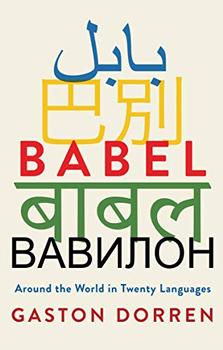Summary | Excerpt | Reviews | Beyond the Book | Readalikes | Genres & Themes | Author Bio

Critics' Opinion:
Readers' Opinion:
First Published:
Dec 2018, 320 pages
Paperback:
Dec 2019, 368 pages
 Book Reviewed by:
Book Reviewed by:
Erin Lyndal Martin
Buy This Book
Family Many attempts have been made to place Japanese in a family (Altaic, Austronesian, even Dravidian), none ultimately convincing. The language may be a mix of those spoken by the archipelago's original inhabitants, known as Jōmon, and by the newcomers who arrived in the first millennium bce, named Yayoi.
Script Japanese uses a baffling trio of scripts – hiragana (the main alphabet with forty-six characters), katakana (with extra syllables for foreign words), and kanji (Chinese characters) – as well as romaji (Roman script). There is more on this in chapter 2b, following the chapter on Chinese characters.
Grammar Japanese words can take strings of suffixes. This 'agglutinative' character was a major reason why it was placed, along with Turkish, Korean and many smaller languages, in the Altaic family (a now discredited idea). Japanese has no grammatical gender, no plural and no articles. Verbs are conjugated, but not for person (I, you, et cetera). Adjectives are not a separate word group; some behave like verbs, others like nouns.
Sounds Vowels can be short or long, but never appear in diphthongs. Syllable structure is very simple. The duration of syllables and words is measured in moras, a typically Japanese concept (though the word is Latin). Tone is relevant for word meaning, but in a limited way and varying between dialects.
Loanword Traditionally from Mandarin and other Chinese languages; today English.
Exports bonsai, emoji, anime, judo, jujitsu, karate, karaoke, sake (liquor), sushi, wasabi, futon, geisha, gingko, go (board game), hara-kiri, kamikaze, haiku, manga, sumo, origami, tempura, koi, shogun, kimono, tofu, tsunami, samurai, tycoon and many more. Mandarin has borrowed more words from Japanese than from any other language.
Dutch Japanese has a surprising number of loanwords from Dutch due to the Netherlands being the only European nation allowed to trade with Japan from 1641 to 1858, making it Japan's gateway to Western culture and knowledge. Examples include buriki 'tinplate' (from Dutch blik), karan 'tap, faucet' (from kraan), sukoppu 'spade' (from schop) and zukku 'canvas' (from doek).
13: Japanese Linguistic gender apartheid
Do women and men speak the same language? The obvious answer seems to be 'yes': people speak whatever language they are born into, irrespective of gender. Alternatively, the answer switches to 'no' if you interpret language as 'things people say' or 'the way people talk'. Women and men do not speak in quite the same manner, sociolinguists and psychologists have taught us, and though the twain love to meet, they don't have an easy time of it.
But there is a third answer, and it comes from Japan. On the one hand, it's hardly an overstatement to say that all Japanese speak Japanese – the country is exceptionally monolingual. On the other hand, linguistic differences between women and men go well beyond the level of 'things people say'. The language has two varieties, one for each gender – with gender, for once in this book, not referring to a grammatical phenomenon, as in 'German has three genders, Arabic has two'. In Japanese, it's all about human gender; about people's sex as seen from a social rather than a biological perspective.
Human gender matters in many other languages. If you're Spanish and you wish to say so in Spanish, you'll put it as soy española if you're a woman and as soy español if you're a man (and if you don't gender-identify, some linguistic compromise or creativity is required). That's because in Spanish and quite a few other European languages, your grammatical gender is determined by your social gender (or, in a more traditional view, by your biological sex). On that basis, you choose the corresponding forms of adjectives, nouns, pronouns and sometimes verbs.
Excerpted from Babel by Gaston Dorren. Copyright © 2018 by Gaston Dorren. Excerpted by permission of Atlantic Monthly Press. All rights reserved. No part of this excerpt may be reproduced or reprinted without permission in writing from the publisher.





The Flower Sisters
by Michelle Collins Anderson
From the new Fannie Flagg of the Ozarks, a richly-woven story of family, forgiveness, and reinvention.

The House on Biscayne Bay
by Chanel Cleeton
As death stalks a gothic mansion in Miami, the lives of two women intertwine as the past and present collide.

The Funeral Cryer by Wenyan Lu
Debut novelist Wenyan Lu brings us this witty yet profound story about one woman's midlife reawakening in contemporary rural China.
Your guide toexceptional books
BookBrowse seeks out and recommends the best in contemporary fiction and nonfiction—books that not only engage and entertain but also deepen our understanding of ourselves and the world around us.